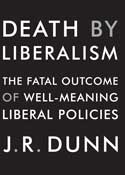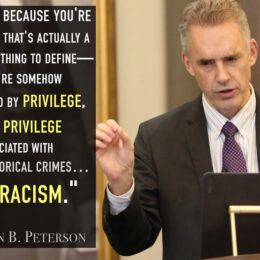 by J.R. Dunn
by J.R. Dunn
Many AT readers are aware that I have been working on a book project for the past several years. I have mentioned it occasionally on this site, more often in the past few weeks as publication drew nearer. Now zero hour has arrived: Death by Liberalism. The Fatal Outcome of Well-Meaning Liberal Policies is available as of today. (Buy it here.) It’s the first publication from Broadside Books, renowned editor Adam Bellow’s new conservative imprint.
Simply put, DbL deals with the appalling and overlooked fact that liberalism kills. This is no metaphor, no exaggeration, and no mistake. Liberal policies put in place by liberal politicians to achieve liberal goals kill thousands of Americans each year. In the past half-century, liberalism may have killed up to 500,000 American citizens (and this is not even counting DDT or ethanol, which are responsible for a death rate orders of magnitude larger in the international sphere). We have known for years that liberalism is corrupt, wasteful, and futile. Now we know that it is even worse. Liberalism is lethal.
The soft lethality of liberalism is a result of that saddest of English phrases: “unintended consequences.”
How does this work? Is it some sort of grand Sorosian conspiracy to assure limitless political power? An environmentalist Green scheme to cut the population on behalf of Mother Gaia? Not at all. The soft lethality of liberalism is a result of that saddest of English phrases: “unintended consequences.” Liberal politicians, academics, and operatives want to do good. They want to benefit Americans and the country as a whole. They want to do it their way, through large-scale governmental policy. They know exactly how it is to be done, and they will brook no interference. So they set out on their grand schemes, and it ends, always and without exception, in disaster. Some of those disasters go over the line into something resembling mass negligent homicide: the legal procedural revolution, the DDT ban, CAFE fuel standards, federalized child protection, deinstitutionalization of the mentally ill, and gun-free zones, to mention only a few.
Let’s take federal child protection as an example. Shortly before becoming vice president under Jimmy Carter, Senator Walter Mondale sponsored a bill aimed at the reform of child protection services. Established to assist and rescue children from abusive and neglectful adults, these services had been operating for a century with good results, many of them privately run and associated with churches and other charities. Mondale wished to transform them all into state agencies, funded by government, staffed by trained professionals, with operating standards set by federal bureaucrats.
The result was exactly what any student of Hayek, Parkinson, or Sowell could have predicted. The government-run agencies became typical bureaucracies, marked by incompetence, callousness, and endless paperwork. Across the country, children under the care of such agencies began dying. For thirty years and more, scarcely a week has gone by without yet another newspaper report of a child murdered while under the “protection” of one of these agencies. The numbers may well mount into the thousands. We can’t be sure, since the bureaucrats in charge often hide behind privacy laws to stifle investigations and outside oversight. (This doesn’t always work — in Philadelphia last year, no fewer than nine social service social workers were found guilty of complicity in the starvation death of Danieal Kelly).
Did Walter Mondale intend any such thing? Not at all — he meant well. He went for the customary big-government solution; he was intent on fixing something that wasn’t broken. The result was suffering on a massive scale. To his credit, Mondale is on record as regarding the bill as an action he regrets. Most liberal politicians responsible for similar policies would admit to no such thing.
liberalism is viewed as a religion
They would remain silent because liberals do not look upon their ideology as a political doctrine to be judged by the same standards as all others. No — liberalism is viewed as a religion — a religion of the purely millennial type, promising its believers a new, pure, utterly transformed world. Its leaders are the saints and heroes — Oldsmobile Teddy Kennedy, Grand Kleagle Robert Byrd, and Charlie “what taxes?” Rangel — who will lead us into this new world. But with DbL, this illusion has come to an end. No longer can liberals shield themselves from their actions. No longer can they present themselves as messianic figures magically and unerringly healing a fallen world.
They are not happy about this. The first reviews of DbL have been marked by a sense of shock coupled with outrage. The common response is that the book is “illogical”— it’s like being criticized by an army of Mr. Spocks. None have actually critiqued that logic — which consists of simple empiricism, the contention that effects must have a cause — in any detail. Several reviewers have outright lied about the book, one claiming that I’m referring to people “dying of heart attacks from working too hard to pay taxes.” Another states that I claim that liberals will soon be hunting us down “with their guns.” (What kind of liberals does she know, I wonder?) And this is only the beginning. I’m scheduled to appear on Lawrence O’Donnell’s “Last Word” this Thursday, and I doubt that he intends to congratulate me on the excellence of my research.
liberalism [has] become the ideology that abuses Down infants, that supports and excuses terrorists, that attempts to exploit mass murders
Such a reaction is understandable. All that liberalism has left is its patina of virtue — the claim that liberals are always right, that they know all the answers, that they alone embody the good in the political sphere. This is fading fast, as liberalism becomes the ideology that abuses Down infants, that supports and excuses terrorists, that attempts to exploit mass murders. I hope that DbL represents yet another step in this process.
I’ve been writing for AT for a little over five years now. In that time, I’ve gotten much in the way of encouragement and useful criticism. It was an AT reader who inspired DbL in the first place, with a question as to whether “there was anything like a black book of liberalism.” I know I’ve come a long way as a writer, a thinker, and a conservative in that time. I’m sure we all have. We have a long road ahead, and we are now moving into a new phase, a new level of activity and influence. I hope you are all looking forward to it as much as I am.
HT: American Thinker



